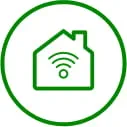Why does internet security matter?
Every click, every upload, and every download generates a trail of data. In the current era of smart homes, remote work and cloud-based services, personal and sensitive information is constantly flowing through your connection. Cybercriminals are well aware of this fact, making internet users potential targets for data breaches, identity theft and cyberattacks.
In fact, it is quite likely that you have been impacted by data compromises if you have been active online in the last several years. According to Statista, in 2022 alone, there were 1,802 data compromises that impacted a total of 422.14 million individuals in the United States. When these data breaches occur and you are impacted, you will likely receive an email notification that an account of yours has been compromised.
The consequences of a lack of internet security are wide, affecting millions of people at once. Compromised IoT (Internet of Things) devices, such as smart home devices, could allow hackers to control them remotely and endanger your home security and privacy, while unauthorized access to your financial accounts could result in major financial losses from unauthorized transactions or credit card bills, and even drained bank accounts.
What can I do to protect myself online?
Internet safety does not weigh heavily on many of our minds, as the consequences are not necessarily tangible or immediately realized — often until it’s too late. Let’s take a look at some methods and precautions you can take to protect your online presence.
Strong passwords: Set strong, unique passwords for your router and WiFi network. According to the CISA (Cybersecurity & Infrastructure Security Agency), it is better to avoid using default passwords, as these are often known to hackers .
Browsing safely: Stick to secure websites (look for "https" in the URL) and be cautious when clicking on links or downloading files from unknown sources.
Public WiFi awareness: Avoid using public WiFi for sensitive transactions. Consider a Virtual Private Network (VPN) for your computer and phone to encrypt your data.
Multi-factor authentication (MFA): Enable MFA wherever possible to add an extra layer of security to your accounts. Common examples of MFA include answering a series of personal questions or using another device, such as your phone, to enable access.
Regular updates: Keep your router's firmware and your devices' software up to date. Manufacturers release updates that often include security enhancements.
Firewall protection: Make sure your router's firewall is activated. This acts as a barrier between your devices and potential threats, helping to safeguard your data from unauthorized access.
Encryption: If your router settings allow for WPA3 encryption, enabling this can make your WiFi network resistant to security risks, such as offline dictionary attacks (when an attacker attempts to guess possible passwords offline so that their activity cannot be tracked). This provides advanced security features that can protect against unauthorized access.
While each method is a great way to enhance your online security, they are stronger when implemented together. Consider adopting both technical and habitual solutions to maximize your safety.
Is fiber internet more secure than cable internet?
Fiber internet's security superiority lies in its technology. Unlike traditional cable connections, which can be susceptible to electromagnetic interference and signal interception, fiber-optic cables transmit data using light pulses. This inherent difference makes it difficult for hackers to detect and intercept or tap into the connection without causing noticeable disruptions.
It’s important to know, however, that both fiber and cable internet are vulnerable to various online threats such as malware, phishing, hacking, and data breaches. The type of connection doesn't necessarily determine the susceptibility to these threats — it's more about the security practices of the user, the ISP and the online services you use.
That’s why it’s important to follow basic security steps as outlined above.
That said, fiber-optic internet is built for the future, unlike cable, which is still working with antiquated technology. Ziply Fiber, which owns and operates its own 100 Gig fiber network, backs up its network so even when outages or maintenance occur, data flow and security aren’t impacted. This is especially important for businesses of all sizes, which rely on data protection for transactions, customer information and other critical details.
Security features of fiber internet
Here are some ways in which fiber-optic internet is a secure choice.
Physical Security: Fiber internet uses strands of glass or plastic fibers to transmit data using light signals. Fiber-optic lines are difficult to tap into without physically accessing the cable, making it more secure against certain types of physical attacks compared to coaxial cables used in cable internet.
Interception: Fiber-optic cables are less susceptible to electromagnetic interference and eavesdropping compared to traditional copper cables used in cable internet. This can make it harder to intercept data from fiber connections.
ISP Practices: The security of any internet connection also depends on the practices of the ISP. ISPs that prioritize security measures, regular updates, and strong encryption will provide a more secure connection regardless of whether it's fiber or cable.
Providers of fiber internet often offer integrated security solutions that have additional security features and services that protect your devices and online activities. Plus, fiber allows for enhanced data encryption that adds yet another extra layer of protection. Optical encryption, a highly favored method, ensures security by encrypting data as ciphertext with a unique key, preventing unauthorized access through a shared encryption and decryption process distributed among authorized users.
How will fiber internet protect me in the future?
Though fiber is not immune to data breaches, its future-proof technology and secure architecture positions it well for keeping data safe as internet usage evolves and faces more risks over time. With the right measures in place, your fiber internet connection can offer not only the swiftness you desire but also more protection. It's crucial to remember that security should be as integral as speed as you navigate the interconnected world, and a lot of that security comes down to protecting yourself online. Let fiber internet empower you to explore, connect and create with confidence.






